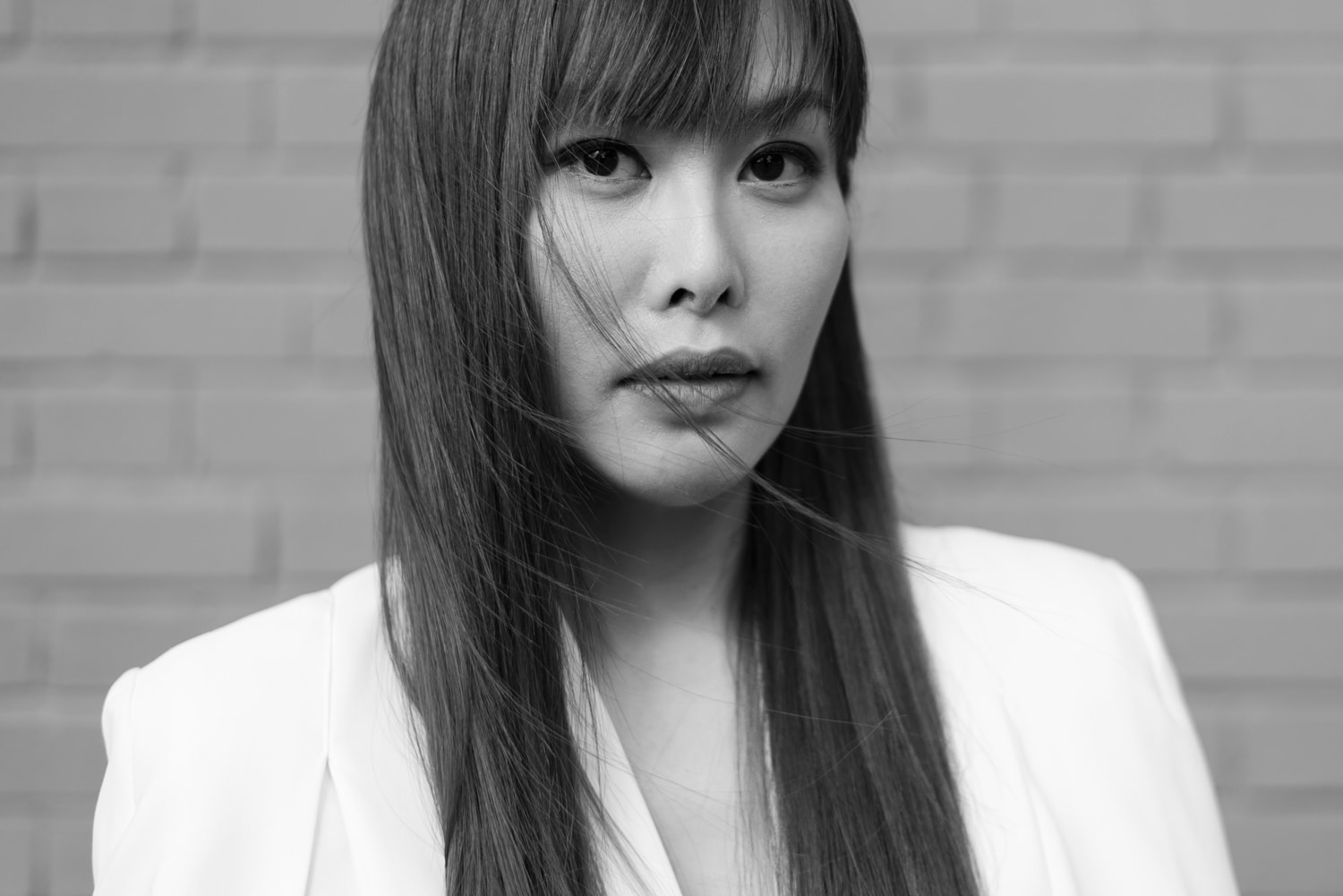Jenny Tay: Resurrecting Death's Trade

It’s mid-afternoon on a Monday, and I’m waiting for Jenny Tay at the premises of her funeral parlour in Geylang Bahru. Dominating the showroom is an outsized, gleaming gold casket, centred on a rotating platform. The gilded coffer looks just like a behemoth bar of molten gold, and it’s such a show-stopper that I simply cannot take my eyes off it. As I wonder about the cost of such extravagance and exactly who would purchase it, Jenny arrives, fresh from an off-site meeting. Tall, slim and svelte, Jenny cuts a cool and graceful figure, seemingly aloof from the heat and sweltering humidity. Her crisp white top reveals a deep and daring sliver of cleavage and she wears it well—with bold confidence and good taste, qualities that show in the work she’s done to revamp the local funeral industry. Jenny emanates the quiet calm and assurance of a Buddhist monk. She speaks thoughtfully and with measure, revealing a sensitive nature that comes from working with the bereaved. Yet, beneath the velvet tones of her voice runs a steely conviction driving her to succeed. The mortuary business runs in Jenny’s blood. Her father, Roland Tay, is a famed undertaker known for conducting charity funerals for the poor and needy, including those of high-profile crime victims and convicts. When Jenny first joined Direct Funeral Services in 2013, she knew nothing of the business apart from what she’d read about her father in the news. The lack of experience has not prevented her from blazing a trail to revitalise what many believed to be a dead-end trade. Since taking over management from her father in 2014, Jenny has tripled the company’s revenue from two to seven million dollars per annum. She’s also taken on the challenge of refining local wakes and funerals into sleek, custom affairs featuring crystal lamps, floral centrepieces and white-gloved attendants, specially trained to care for the needs of both the living and the dead. “Funerals should be a celebration of an individual’s life,” Jenny says. “If we’re paying so much attention to the details of a wedding, why can’t we do the same for a wake?” I learn that the eye-catching casket is 24k gold-plated and costs an impressive $60,000. It is the exact model that the King of Pop, Michael Jackson was laid to rest in, and orders for it come mostly from the rich and affluent in neighbouring countries where burial rather than cremation is more common. As Jenny poses next to the showpiece for our photo shoot, her husband, Darren Cheng, an executive director of the company, waits patiently nearby—never far from her side. A stalwart supporter of Jenny, Darren quit and closed his private counselling practice to accompany her into a male-dominated field, helping her become a force for change. Together, they’ve introduced employment benefits, career progression and better accreditation to the industry, attracting younger workers and fresh graduates to the line.
TEO REN FENG: What’s something unusual that you ask potential hires who want to work for your company?
JENNY TAY: Darren’s the one who does the interviews. He majored in psychology and was a counsellor. He’s our personality test. [laughs]
DARREN CHENG: My first question is always to ask if they have experienced loss in the family. I like to hear what the experience was like for them and their family because you can understand a fair bit about the individual’s personality and approach to life.
REN FENG: What qualities do you look for?
JENNY: Empathy and the heart to serve. Those are the two most important things for us. The technical know-how of how to conduct a funeral can be taught, but it’s nothing without the right attitude and sincerity.
REN FENG: That’s what one would expect from a social or aid worker.
JENNY: Funerals are about being part of a community, so we’re not just a business per se. As an essential service, we serve families and clients in one of their most vulnerable moments and we recognise that this makes the services we offer very important.
REN FENG: How does this belief affect the way you run your business?
JENNY: In everything that I do, I put myself in the customer’s shoes. When I attend a wake, I always question myself: What could I have done better for the customer? We are very reflective and constantly think about how to improve our service—that is the core of our company’s purpose.
REN FENG: What are some changes and improvements you’ve made, since joining the company in 2013?
JENNY: Both of us (Darren and I) suffered a culture shock when we first joined the business and discovered that key service standards were lacking in the industry. Since then, we have implemented wait service at wakes and introduced an emcee service to help professionalise proceedings. Previously, it used to be someone dressed casually, reading off a script and directing mourners through the rites in an offhand manner. It was all very haphazardly done, which took me by surprise because I believe funerals should be conducted with dignity. Although emcee services are still uncommon at funerals in Singapore, we’ve found that it helps to comfort families and loved ones, and we want it to be an option available to all. Friends of clients have approached other local operators asking for this service, and I’ve witnessed some adopt the practice, which is a good thing. Competition is what we need to raise the entire industry.
REN FENG: Some might feel these changes don’t follow tradition.
JENNY: Traditions are in the rites and rituals and those are “roots” that we continue to hold on to. We’re offering new services to better meet our customer’s evolving needs and sometimes the older folks cannot relate to it because it’s different from what they’ve always known.
REN FENG: As a pioneer for change, you must have encountered resistance.
JENNY: Change was difficult, even with the littlest things. Just improving the uniform standards in our company took us over half a year to achieve. We wanted to ensure that everyone wore their uniform correctly—shirts tucked in, paired with the proper shoes—taking pride in showing that they are a part of our company.
Respect has to be earned.
REN FENG: How did you manage it eventually?
JENNY: There is always going to be resistance to anything new. You need to grit your teeth and push through. After awhile, people will begin to accept it and slowly embrace it. But you need to have a mental expectation that the initial process isn’t going to be easy. In our first year, we actually avoided making any changes. We observed and worked the ground with our staff for about 9 months to a year, before beginning our revamp. It’s very important to do things gradually. Nobody’s going to listen if you come in demanding for immediate change. We wanted to build good rapport first by being hands-on and learning from our staff. Respect has to be earned.
REN FENG: What is your vision for Direct Funeral Services?
JENNY: We want to be an end-of-life hub—a place for families to do their advanced planning and the handling of their estate and wills. It’s something that should be done, just like buying insurance. We recently wrote a book titled Last Wishes, and offer it to our customers so that everyone learns more about end-of-life planning.
REN FENG: That adds a new dimension to your services.
JENNY: We don’t see ourselves as a company that simply conducts funerals. We want to be able to offer assistance and advice to families and those in their silver age, because we’ve often received queries from friends and strangers on affairs related to death. We are always happy to help without obligations.
REN FENG: Has this hub always been an end goal, or is it something that’s evolved organically from your work?
JENNY: It was organic. Our intention when we came into the business was to help my father tide over a difficult period. He had suffered a heart attack, and there was no one to help his business. After having learnt about my father’s work and his charity service offering free funeral services to the needy, we decided to expand and carry on his vision. We’ve also started Direct Line Foundation to help the elderly who are alone and in need of company. It was motivated by a case where an old man came to us for help, as he lived alone and had no one to look after his funeral needs once he passed on. When we paid him a visit in his one-room flat, two other elderly neighbours came to us asking about arrangements for themselves. By starting this platform, we hope to connect these people with others and to raise awareness of their situation.
REN FENG: How do you incorporate charity into your business model?
JENNY: My father, Darren and I have never seen charity as a CSR (Corporate Social Responsibility) requisite. It comes from our heart when we try to help, even if that means doing pro bono work.
REN FENG: As you grow the company, how do you still maintain a personal touch?
JENNY: We’re not trying to corporatise our company and make it “cold”. We just want to deliver good standards of professional service to our clients, with warmth and care. We still offer dedicated, one-to-one service to customers, which is not something that can be digitised. They will always be able to reach us by phone 24/7 and expect our immediate availability.
REN FENG: How did you prove yourself as a credible successor?
JENNY: It was hard at first. A lot of competitors, industry players and even some of our older staff doubted my ability as a woman since I had no background in the field. But I didn’t care. [laughs] I chose to focus on myself by observing, learning and practising as much as I could. Bit by bit, when people realised the changes I introduced had positive effects, they started to take me seriously.
I really believe in what my father told me when I was young: “When you hit a roadblock, you should not run against it. You can choose to go many other ways and work around it.”
REN FENG: Did you doubt or question yourself at any point?
JENNY: No. I’m someone who’s very garang. [laughs] When we joined the business, my father had an ongoing lawsuit with his ex-wife, which meant we had to start from scratch. We borrowed money for new offices, rented embalming premises and struggled financially the first year. It hasn’t been easy and certain problems can hit you emotionally. But I’ve always picked myself up and found ways around a problem. Having the right mindset is very important. I’m very positive and I really believe in what my father told me when I was young: “When you hit a roadblock, you should not run against it. You can choose to go many other ways and work around it.”
REN FENG: Do you feel having your father’s support was essential to your success?
JENNY: Definitely. The contacts and friendships that my father built over the years helped us through the difficult times at the beginning. He was also very willing to accept new ideas and constructive criticism. We know family businesses where the children have found it very hard to take over when the parent or company refuses to change. Even though he felt that he knew best from experience, he still heard us out and was very open-minded.
REN FENG: It sounds like it was a smooth transition.
JENNY: We argued a lot. [laughs] He was always telling me to “draw and make [it] clear” whenever I made any suggestions. It frustrated me for a year before I realised that it was because he didn’t get my verbal and abstract-driven proposals. So I learnt to use 3D models and mock-ups to help him visualise my concepts and provided concrete examples when necessary. I actually made a sample when I was proposing to have new uniforms so that he could touch the material. Understanding and adapting to his working style made him more receptive to our suggestions and changes.
REN FENG: When working with family members, how do you draw the line to ensure that work disagreements don’t carry over into your personal relationships?
JENNY: We segment our roles and responsibilities clearly. We discuss plans with one another, but ultimately whoever is in-charge makes the final decision. We are all very respectful of each other and are careful to give each other professional space and autonomy. It’s not about drawing a line, but believing that we are each doing what serves the company’s best interests. It definitely helps that we are also self-aware and can manage our emotions objectively.
REN FENG: Do you get emotional? When was the last time you cried at a funeral?
JENNY: It was a sad case because my friend’s brother committed suicide. When it’s death by natural causes or old age, a funeral is a heart-warming celebration of a person’s life. But when it happens to a young person, it gets highly emotional, especially when you see the older generation send a younger one off. We had to excuse ourselves to gain some composure at the funeral. You don’t get numb. I will always feel very emotional, especially at the cremation hall, when everyone’s emotions are at a peak.
REN FENG: It must be tiring to constantly be in such emotionally charged situations.
JENNY: Being in close and constant contact with the departed and their loves ones grounds us. We reflect a lot on whether we’re living our lives to the fullest—if we’ve been filial to our parents and whether we can treat those around us better. The constant emotional state helps us be better people.
I’ve tried to mend relationships that weren’t so good by putting aside my pride.
REN FENG: Are there any regrets that you wouldn’t want to have on your death bed?
JENNY: I don’t wish to have any regrets on my death bed and I’ve tried to mend relationships that weren’t so good by putting aside my pride. Now, I’m much closer to my family and everybody has noticed the change.
REN FENG: Have you changed in any other way?
JENNY: I have been told to act more “manly”, and be more masculine to survive in what is traditionally a man’s vocation. But I think women can run this business just as well. We have associated traits that are very pertinent to this line of work, such as being soft, approachable and more sensitive. And we can definitely still dress up and be vain. [laughs]
While others can easily copy the “hardware”—all the set-ups and services that we offer, our “heartware” is something that is hard to imitate.
REN FENG: Besides introducing new designs and set-ups to improve the presentation of local funerals, you also set up a florist business to create floral arrangements to your specifications. Does this satisfy a desire for beauty amidst what is usually a grim setting?
JENNY: I have always liked things to be aesthetically pleasing. In the past, and even now, a lot of funeral companies rent generic set-ups from suppliers. But we take pride in our image, and so we actually have a warehouse full of props and set-ups that we design and produce ourselves.
REN FENG: With others quickly catching on and offering the same services and amenities, what do you think will continue to give Direct Funeral Services an edge?
JENNY: We’re always happy to have competition because it helps to improve the industry on the whole. However, while others can easily copy the “hardware”—all the set-ups and services that we offer, our “heartware” is something that is hard to imitate. We are genuinely passionate about what we do, and the constant pursuit of improvement will remain our edge.
REN FENG: Do you have a creative process?
JENNY: It is just in the way we live and breathe. We’re always open to new ideas. Sometimes when we’re on a holiday overseas, we will visit local funeral parlours just to see what our counterparts are doing, and if there are learning points which may be applicable to us. We were just in Taiwan for a leisure trip and took some time to visit other funeral directors.
REN FENG: You’re taking the lead from funeral businesses in Taiwan and Japan. Why?
JENNY: They are steps ahead in professionalising this industry, and being similarly Asian in their customs and practices, we feel they are the best people to serve as a point of reference.
REN FENG: Why do you think that Singapore’s funeral industry has developed slower than Taiwan’s and Japan’s?
JENNY: Service is not a career that is actively pursued in Singapore. It’s not seen as a glamorous job. Over there, funeral directors are viewed as professionals, just like doctors. So I guess the perception of the industry’s career prospects has impeded the growth and development because it is not a “typical occupation” one might enter.
REN FENG: What do you hope to achieve?
JENNY: A lot of the funeral companies here are worried about passing on the trade because it is hard to hire anyone young. We want to raise the standards and image of the industry and make it a professional career option for those who might be interested in it.
REN FENG: Any last words?
JENNY: A Japanese funeral director once told me this: “If a person had to choose between attending a wedding or a funeral, most would choose the funeral.” It is the last chance that you’ll get to see and spend time with that person. So if we’re paying so much attention to the details of a wedding, why can’t we do the same for a wake? This field is not for anyone—it requires certain characteristics, but it also offers great emotional and tangible rewards.
****
Edited by Wy-Lene Yap





